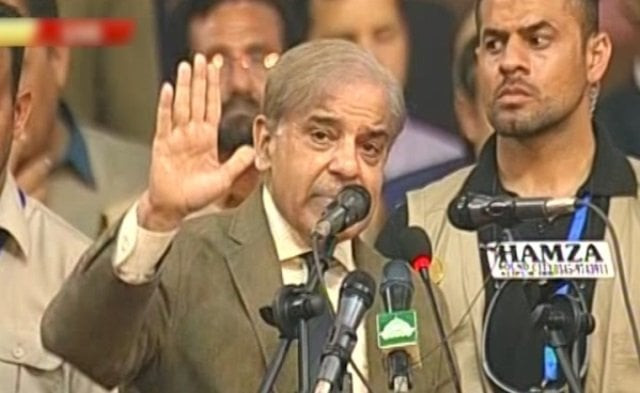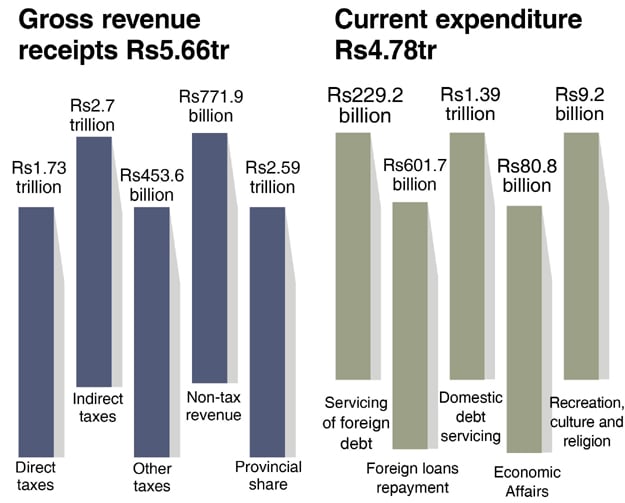With some relief and new taxes, PML-N draws the curtain on its budgets
Gives incentives to industrialists, stock market as well as importers of coal and LNG

Gives incentives to industrialists, stock market as well as importers of coal and LNG . SCREENGRAB/FILE
The government also reversed the decision of increasing the income tax exemption threshold from Rs400,000 to Rs1.2 million, a move aimed at saving an already narrow tax base of 1.26 million people. It proposed to levy a fixed Rs1,000 as tax on those whose annual income falls in the range of Rs400,001 to Rs800,000 and Rs2,000 as annual tax on those earning in the range of Rs800,001 to Rs1.2 million. The nominal amount is meant to keep these people in the tax net.
Some major relief measures included abolition of 5% tax on bonus shares, reduction in the rate of corporate and super tax, and decrease in taxes on undistributed profits.
However, new indirect taxation measures will largely offset the impact of steep cuts on income tax rates for individuals and other tax concessions given to industrialists.
The federal government has proposed Rs93.3 billion in additional revenue measures, but has also given relief amounting to Rs184.5 billion for fiscal year 2018-19, said Federal Board of Revenue (FBR) Chairman Tariq Pasha, while briefing media on taxation measures after the budget announcement.
He said that the 2018-19 budget would cause a net negative impact of Rs91.2 billion on the FBR’s tax base.
The government also took customs duty measures that would bring in Rs29 billion, but also gave Rs6.2 billion as relief. New sales tax and federal excise duty measures amounted to Rs50.4 billion and Rs29 billion were given in relief. New income tax measures stood at Rs14 billion, but the relief was given to the tune of Rs149.3 billion.
However, the government has also covered this gap through a non-tax measure, as it has proposed to impose a fixed Rs30 per litre petroleum levy on all petroleum products. This single measure will generate an extra Rs140 billion for the treasury.
The most regressive measure was the FBR’s decision to increase 1% additional customs duty on almost all imported items except those that come on concessionary rates under bilateral free trade agreements. It has been charging 1% additional customs duty on all the four slabs.
The 1% additional duty will be applicable on 7,200 imported tariff lines, said Zahid Khokar, member customs of the FBR. The government will earn an extra revenue of Rs28 billion from the measure. The effective rate of 3% customs duty slab will now be 5%, the 11% slab rate has been revised to 13%, 16% slab’s effective rate will be 18% and 20% highest slab’s effective rate will be 22%.
The other regressive taxation measure was the increase in further sales tax rate from 2% to 3%, which will generate Rs12 billion in additional revenue. The tax is charged from those who are not registered sales tax persons. There are less than 150,000 registered sales tax persons.
The decision will effectively increase the standard 17% General Sales Tax Rate to 20%, which would have an inflationary impact.
The government has also increased the tax rate on cement by Rs0.25 to Rs1.5 per kilogramme, aimed at getting an additional revenue of Rs11 billion, said FBR’s Member Inland Revenue Dr Mohammad Iqbal. Finance Minister Dr Miftah Ismail announced that the government will not levy any new tax in the budget. But it has actually levied three new taxes. It has introduced a gift tax, a withholding tax on sale of petroleum products and 1% to 3% advance tax on persons remitting amounts abroad through credit, debt or prepaid cards.
The government has proposed a Rs4.435-trillion tax collection target for the FBR for the new fiscal year 2018-19, starting from July. This will be Rs422 billion or 10.5% higher than the outgoing fiscal year’s original target of Rs4.013 trillion.

Customs relief measures
To encourage local manufacturing of Optical Fiber Cables, customs duty on input materials has been reduced.
In a major relief measure, the government reduced custom duties on the import of coal across the board from 5% to 3%, which will cut its revenues by Rs2.5 billion. Similarly, the government has cut the duties on import of fire fighting vehicles from 30% to 10%. It has also allowed concessionary import of vintage or classic cars and jeeps at fix duty/tax of $5,000.
Customs revenue impact
The government has increased duties on double-sided tape from 3% to 11%. To protect domestic manufacturers, it increased customs duty on rickshaw tyres from 11% to 20%.
Sales tax relief
The government has waived off 3% value addition tax chargeable on the import of LNG. It reduced rate of sales tax from 17% to 12% on import of LNG by PSO and PLL and on supply of RLNG by these companies to SNGPL.
It also reduced rate of sales tax to 2% on all types of fertiliser across the board and reduced rate on supply of natural gas to these plants for use as feed stock from 10% to 5%. This will adversely hit the FBR revenues by Rs17 billion. Moreover, sales tax on LNG imported by fertiliser manufacturers for use as feed stock is also being exempted.
The government restored the zero rating facility for the stationery sector. The 3% tax on import of second hand worn clothing and footwear has been waived.
The government also extended the input tax adjustment on packing materials to five export-oriented sectors covered under SRO 1125, which will dent its revenues to the tune of Rs13 billion, said the FBR chairman.
The rate of duty on locally produced cigarettes is being enhanced for tier 1 from from Rs3,740 to Rs3,964, for tier-two from Rs1,670 to Rs1,770 and tier-three Rs800 to Rs848. The federal excise duty on cement is being increased from Rs1.25 per kg to Rs1.50 per kg. The rate of sales tax for the steel sector is being increased to Rs13 per unit of electricity consumed against the earlier rates of Rs10.50 per unit. Moreover, the rate of sales tax for other allied steel industries is also being rationalised.
Income tax
The government has announced to reduce the corporate tax rate from 30% in Tax Year 2018 to 25% in Tax Year 2023, through a 1% reduction each year.
The government has introduced a major reform in the real estate sector. Property transactions will be recorded at the value declared by the buyer and seller. The government has abolished property valuation rates notified by the FBR.
At the federal level, 1% adjustable advance tax from the purchaser on the declared value has been introduced by abolishing the old rate of 4%.
Non-filers will not be permitted to purchase property with a declared value exceeding Rs4 million.
The government has also proposed to get the preemption right. In order to deter under-declaration and consequent loss of revenue, the FBR will have the right to purchase any property within six months of registration by paying a certain amount over and above the declared value, which may be 100% in the fiscal year 2018-19, 75% in 2019-20 and 50% in 2020-21 and thereafter.
The government has also announced to reduce the rate of super tax. The rate for both banking as well as non-banking companies will be reduced by 1% each successive year starting from financial year 2018-19.
The government also accepted another demand of the business community. Presently, public companies are obliged to distribute at least 40% of their after-tax profits through cash or issuance of bonus shares within six months of the end of the financial year, failing which such companies are subjected to tax 7.5% of their accounting profit (before tax).
Now the condition of distributing 40% of after-tax profits is being reduced to 20% and the applicable tax rate on accounting profit in case of failure to distribute such dividend is being reduced from 7.5% to 5%.
All the investment schemes are also extended till June 30, 2021, which will give huge benefits to the industrialists.
Published in The Express Tribune, April 28th, 2018.
Like Business on Facebook, follow @TribuneBiz on Twitter to stay informed and join in the conversation.






1710175205-0/image-(9)1710175205-0-208x130.webp)












COMMENTS
Comments are moderated and generally will be posted if they are on-topic and not abusive.
For more information, please see our Comments FAQ